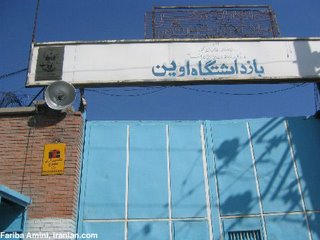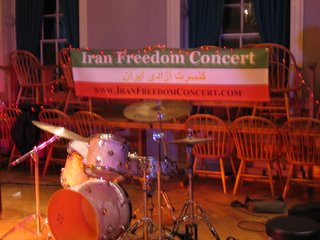Iranian Students are Grateful for Harvard Support Before Harvard’s Spring Break, Alireza Doostdar and Maryam Gharavi wrote an editorial against the Iran Freedom Concert and against my speech at the concert. In the article they questioned my commitment to the Iranian people, suggested that public discussion of human rights in Iran means supporting a US war against Iran, and accused concert organizers of promoting a pro-war agenda.
I am a human rights activist who has been involved in the democratic student movement in Iran for the last decade. In 1996, I was elected, by Iranian students, to the student movement’s central committee known as Daftar Tahkim Vahdat, which is the largest organization for reform and democracy in Iran. From 1998 to 2005, I chaired the organization’s human rights committee.
In Iran, being an outspoken student activist means you have to pay a price – much worse than an angry editorial. Because of my activities, I have been arrested, beaten, and tortured on several occasions. Last year, I was convicted for criticizing Iran’s “Supreme Leader” – Ayatollah Ali Khamenei – and was sentenced to seven years in prison. I know too well how student reform movements in Iran have been struggling to obtain the most basic of human rights for all Iranians.
Since 1979, the Islamic Republic of Iran has been governed by a repressive religious code and ruled by an untouchable “Supreme Leader.” Men and women lack equal rights, and religious minorities face persecution. The “Supreme Leader” cannot be held accountable to any person or any organization. It is a criminal offense to criticize Ayatollah Ali Khamenei, and many who have done so – like Daryoush Forohar, Majeid Sharif, and many others – have been tortured and killed by the regime. Any friend of the Iranian people cannot in good conscience muzzle discussion of human rights as the regime silences and murders dissidents.
Students at Harvard have at last ended their silence on the repression Iranian students face. The Iran Freedom Concert was arranged by students who believe that such undertakings create a better relationship between Iranian and American students. This may be the first time American students have mobilized on campus to support our cause.
Unlike most other dictatorships, Iran has a strong student movement that opposes the regime. Although it is very dangerous, we criticize the government, we hold protests in the streets, and we publish articles and blogs demanding change. Many students have been assaulted, but we continue our struggle and hope that the international community will not abandon us.
At a time when Iranian students feel isolated and vulnerable, it is important for concerned students here to reach out and let Iranians know that they are not alone. I have received many emails of support from friends who want to work with American students. One of my colleagues even hopes to hold an Iran Freedom Concert in Tehran – one day.
It may be difficult for American students to understand the environment Iranians live in. If we tried to do such a concert in Tehran today, the basij (religious militia) would likely storm the event, beat female performers, and arrest the student organizers.
My greatest goal in life is to see a free Iran in which the most basic human rights of all genders and minorities are respected and protected. While I do support the idea of a change in the regime I hope it will come internally, through a free election monitored by the UN, as I have said at many talks in many places.
I would like to point out that I never supported war in Iran. Although I am against regimes like the Taliban in Afghanistan and the Ba’ath Party in Iraq, saying this does not make me a warmonger. And simply opposing war does not make one a supporter of human rights – just look at the anti-war stand of the regimes in China and Russia.
After the September 11th terror attacks, thousands of Iranian students held vigils in solidarity with the American people and against religious terrorism. We wanted to reach out to Americans in a time when you were suffering. Now Harvard students of so many different backgrounds have stepped forward for us.
Today, all Iranians and friends of the Iranian people need to help each other in the struggle for genuine democracy and human rights in Iran.
Akbar Atri, who spoke at the Iran Freedom Concert in Leverett House on March 18th, is a former member of the executive committee of Tahkim Vahdat in Iran.








0 Comments:
Post a Comment
<< Home